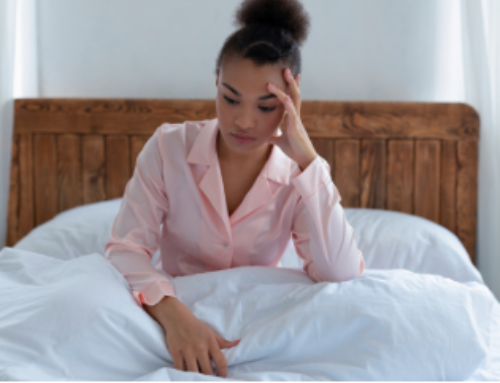When you have trouble sleeping, it may feel like a never-ending cycle. You’re not getting enough sleep, so you’re stressed, and then you’re more stressed because you can’t sleep. Breaking your negative thinking patterns may help you end this cycle and get back to better sleep.
The power of positive thinking
When you’re stressed, negative thinking patterns may be keeping you awake at night. The day’s conversations, projects, deadlines, and decisions loom large when you’re trying to get shut-eye.
A 2016 study found that continuous thinking about negative events in the past or future, known as “perseverative cognition,” is a link between stress and sleep quality.
The next time you find yourself ruminating when you’d rather be sleeping, take a moment to shift your outlook. Case in point: a study examined the relationship between sleep quality and stress in Ph.D. students getting ready to defend a dissertation. Results show that positive outcome expectancy was an important predictor of reduced stress and sleep quality.
Optimistically anticipating the desired outcome may reduce stress and help you sleep better. Researchers at the University of Illinois at Champaign-Urbana found that optimism is associated with more favorable sleep quality and duration. Study participants with higher optimism scores were 74% less likely to have insomnia.
But is positive thinking enough to alter the cycle of stress and sleeplessness?
“For many people, thoughts tend to go toward the negative when the day slows down and they finally lay down to sleep,” says Dr. Kelly Baron, clinical psychologist and Associate Professor in the Division of Public Health, Department of Family and Preventive Medicine, at the University of Utah. “You can be aware of this pattern and stop that train of negative thought using other techniques such as distraction, relaxation, or meditation. Being aware of what is happening and making a conscious decision to do your thinking in the daytime — not from bed — can be helpful.”
Taking a “glass-half-full” approach to everyday, temporary stressors may help you get a better night of sleep. But, if you’re experiencing chronic stress or anxiety, you should seek help from a mental health professional.
Beware of overanalyzing sleep data
Negative thinking patterns may also haunt you if you use a wearable sleep tracking device, such as Fitbit. The popularity of sleep tracking devices has encouraged more people to analyze their sleep habits in hopes of combating sleep problems. Enthusiastically armed with readily available, if imperfect, sleep data, some people are shunning cognitive behavioral therapy in favor of wearable trackers, which may reinforce sleep-related anxiety.
A 2017 case report published in the Journal of Clinical Sleep Medicine explored the use of wearable sleep tracking devices and self-diagnosed sleep disturbances. Researchers coined the term “orthosomnia” to describe the unhealthy obsession with perfecting your sleep data that can lead to worse sleep.
Sleep trackers may heighten anxiety about sleep, especially in those with insomnia. Patients with insomnia may be hyper-focused on improving their sleep duration. Researchers described three patients who spent excessive time in bed in an attempt to improve the sleep data reported by the tracker, which may have exacerbated their insomnia.
“Worrying about sleep does not make it better. In fact, it gets worse. Track your sleep patterns but keep in mind the overall pattern or trend, rather than try to ‘hack’ the perfect sleep every night. That type of perfection just isn’t possible,” says Dr. Baron, the lead author of this report.
While negative thought patterns about a lack of sleep can lead to a cycle of stress and more sleepless nights, positive outcome expectancy and reducing reliance on sleep trackers may help you get more shut-eye.
Instead of mentally rerunning worries or scrutinizing wearable sleep tracking device data, take a look at this checklist of healthy sleep habits to reduce stress before bedtime.
These tips may help you disrupt the pattern of sleepless nights and stressful days. If you continue to experience sleep problems, get help from the sleep team at an AASM-accredited sleep center near you.
Authored by:
Kate Robards





